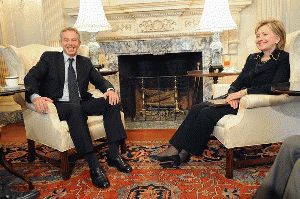At the core of the
Hillary Clinton candidacy, and arguably one of the reasons her
nomination was once considered inevitable, has been the argument that
she is the one with the right experience, something reflected
throughout the mainstream media. The Iowa City Press- Citizen,
for instance, in an article cited on the Hillary for America
website, states that "There can be little doubt that in
terms of raw experience, there is no more qualified person for the
presidency than Hillary Clinton." But wherein exactly does that
supposed experience edge lie?

Hillary Clinton with Tony Blair
(Image by (From Wikimedia) Michael Gross, Author: Michael Gross) Details Source DMCA
What has Clinton done that Sanders has not? Two things, mainly -- she has served four years as Secretary of State and also resided in the White House for eight years as the most politically engaged First Lady in recent memory, an experience that enabled her subsequent Senate career and made her a household name among the populace at large. The question remains, however, as to whether this experience constitutes an overall plus or minus.
Health Care
Although Clinton was involved with many issues while in the White House, the one that stands out both in public memory and in her own campaigning is her involvement in Bill Clinton's unsuccessful effort to reform the nation's health insurance system. As she herself reminds us, before the type of system we currently have was called "Obamacare," it was called "Hillarycare." Her efforts were received notoriously poorly by the health care industry which thoroughly distorted her program, most notably in the infamous "Harry and Louise" television ads.
Her position on health care hasn't particularly changed since then. She was publicly opposed to a single payer plan back then -- although some say that in her heart of hearts she was actually for it. And she's against a single payer plan now.
But the ground has shifted. Now, her argument is not so much that single payer plan is a bad idea. Instead she says that, by his pressing the case for the U.S. to join the ranks of the industrialized nations that have solved the universal coverage problem, Sanders threatens the gains embodied in the current Affordable Care Act. An argument for Medicare for All does the Republicans' work, goes the argument -- so let's change the subject.
What has changed for Clinton is her relationship to the health care related industries, which contributed $11.2 million to her Senate campaigns, $2 million to the current presidential race, and paid her $2.8 million in speaking fees for 13 speeches from 2013 to 2015. During the debates, Clinton has challenged Sanders to name a vote he thinks was altered by her receipt of corporate funding. That might be impossible to say, but what the current situation surely does reflect is her overall acceptance of health care industry executives' point of view and priorities.
So is all of this experience on the health insurance issue an overall positive for Clinton? If you believe that the United States is somehow incapable of accomplishing a universal, nonprofit health insurance system like other countries have, then it probably is -- better not to waste time on something that will "never, ever" happen, as Clinton recently said. But if you do believe that we actually should create that type of system -- as polls show most Americans do -- then Clinton's experience in this area would seem to be a negative.
Foreign Policy
Much as Clinton might wish to shake off her support of the invasion of Iraq as one bad vote from 13 years ago, the fact remains that there's probably been no more disastrous American foreign policy decision since the Vietnam War. The invasion of Iraq was exactly the sort of thing that al Qaeda hoped to goad us into and it, in turn, has midwifed the birth of ISIS. Perhaps the best that can be said for Clinton's vote is that she wasn't the only future presidential candidate in the Senate one seemed to think that you couldn't hope to be president unless you supported Bush's war -- subsequent White House contenders Evan Bayh, Joe Biden, Christopher Dodd, John Edwards, John Kerry, Joe Lieberman, John McCain and Fred Thompson all voted that way. (Bob Graham of Florida was the only anti-Iraq War Senator to pursue the presidency.: Sanders voted against it in the House.)
Did Clinton then at least learn from that experience? Her tenure as Secretary of State suggests not so much. Obviously regime change still seemed like a good idea to her in the case of Gaddafi in Libya, where pretty much the best you can say for the current situation is that it's probably not as bad as Iraq. So far as Syria goes, she has seemed to be of much the same mind. And if she's given any indications in the debates that she's changed her thinking, well I missed it -- and I've seen them all.
Is her foreign policy experience a plus, then? Well, she may still have the cellphone numbers of a few world leaders. And certainly if you think our current policy of seemingly endless war is the way to keep going, then she does have the relevant experience. But not if you're looking for something different.
Everything Else
There's something else, though. Clinton has recently argued that Sanders is a single issue candidate, that one issue being the economy. Pretty big "single issue," of course, but she does raise some quite sensible concerns, among them, "If we broke up the big banks tomorrow, would that end racism? Would that end sexism? Would that end discrimination against the L.G.B.T. community?"
We might then reasonably want to ask whether the candidate who touts her experience has the edge in these areas to which she thinks Sanders devotes inadequate attention.
(Note: You can view every article as one long page if you sign up as an Advocate Member, or higher).





